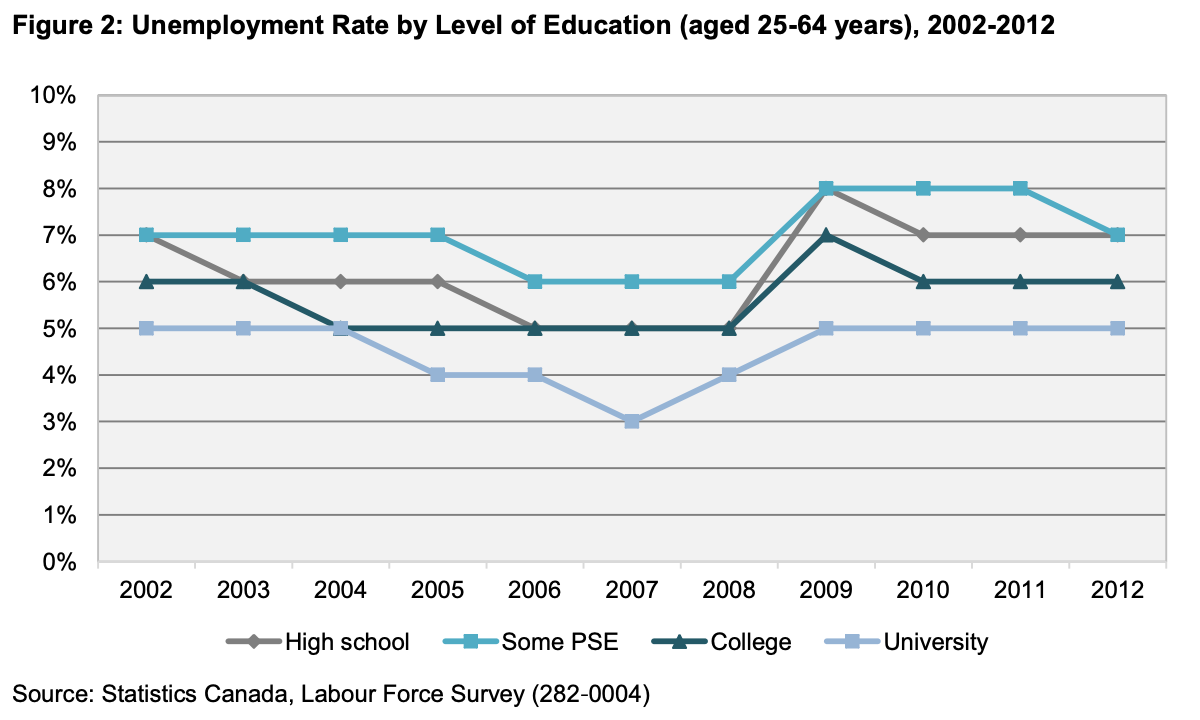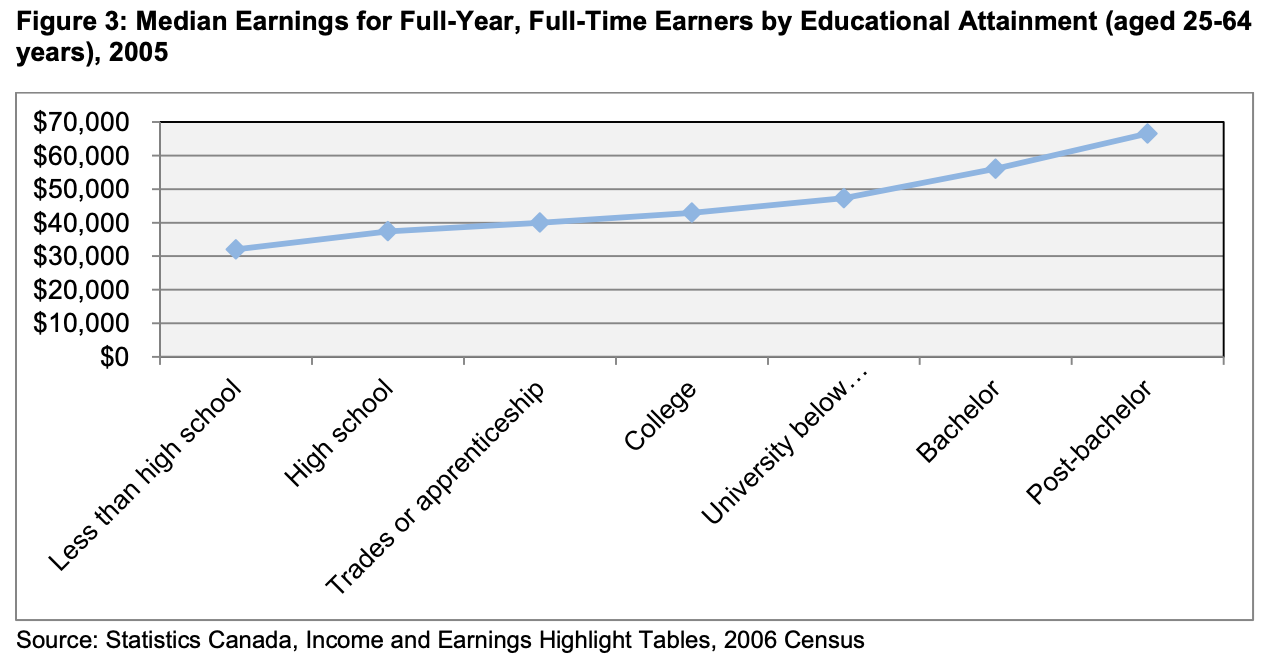Disclaimer: This blog post is based on my knowledge and is subject to changes. I am also not an expert in any of these topics nor do I have much experience in life.
After 12 years of education, you have now finish HighSchool and become an adult but what is next? You have probably 3 options:
- University/College (USA Version)
- Go to a Trades School/College (Canadian Version)
- Go to work right after HighSchool
Some students already decided what they’ll do right after HighSchool and some students do not. All three options are viable and somewhat equally important decisions to make. Once you finish HighSchool, you are probably old enough to make your own decision and are expected to be productive members of society. However, the choice is often hard to make and your own situation in life may narrow your path of what you want to achieve.
Things to Consider on what options you want to pursue: I suggest you read this article: https://80000hours.org/career-decision/article/
Breakdown on the options:
Option 1: Getting a degree from a University
According to studies, those who have a degree tend to have a better job opportunity, higher salary, and higher job security than those who do not. More employers seek to hire those who have a University degree than those who do not for various reasons. Those reasons can include that University Graduates hold more transferrable skills that are desired by employers such as thinking analytically, problem-solving, ability to understand complex problems, and able to relay their knowledge in a clear and concise manner. University graduates have the skills and knowledge to be more organized, productive, and effective than those who do not have higher education (at least in the eyes of the employers). Furthermore, there are many jobs such as Doctors and Lawyers that require specialized and technical knowledge that are hard to learn without a formal education.
Option 2: Getting an apprenticeship or a diploma from a College (Canadian Version)
Those who are not academically inclined want a hands-on education, want an affordable education with little or no debt after graduation, or dislike studying may want to consider this option. Those who want to pursue to get a job in trades (i.e. plumber, mechanic, hairstylist, electrician, cook) will typically go to College to get the training and basic certification for their training. Colleges in Canada are typically 2-3 years and could go as short as 1 year as well. Colleges are less academically rigorous and more hands-on which suits a lot of people (including those in universities) as it is more appealing and interesting to learn. Colleges are also more focused on equipping you skills needed for the workforce, unlike Universities. Those who want a degree but cannot afford the tuition or not academically inclined can get degrees in College as well. There are a number of colleges that offer degrees that are cheaper and “easier” to obtain than your typical degree from a University.
Option 3: Entering the workforce right after HighSchool
There are lots of jobs that will not be available to you since most jobs require skills that are not easily obtainable and require training. A large majority of the jobs available are in the service industry that typically do not pay too well (there are some exceptions of course). Although it is noted that the job market favours work experience over education, we can see that those who do not have an education are most volatile during harsh economic times. According to studies, the recent economic recession during 2008-2009, it has been found that those with University degrees were impacted less than those who have no education.
Students graduating from university after the 2008-2009 economic downturn were better protected from unemployment than high school-only graduates – Higher Education Quality Council of Ontario [1]

As you can see from the chart above, those without higher education (except for PSE which I assume means Post-Secondary Education) have a higher unemployment rate and especially during the 2008-2009 recession.
However, I do want to note that are some jobs that pay fairly well and do not require education depending on where you live and are in demand. In Canada, entering the workforce that are less in the service industry such as a Bus Driver, Postal Worker, member of the Canadian Armed Forces are not bad options. The job may be exhausting but they do pay fairly well considering the lack of a further education. Furthermore, you can always go back to school to get more education later on when you have more experience in the workforce.
I also want to note on the rise of automation will make this option less viable as time passes. Automation will replace most manual and low skill jobs in the next few decades since they can be easily automated. Jobs that are affected include drivers, jobs in manufacturing, and cashiers. This is not the first time the labor market has been disrupted by technology. The industrial revolution has displaced many traditional workers but also created many jobs. However, automation will displace not only low-skill jobs but also a lot of jobs that require a degree such as an accountant. There have been conflicting reports for the service industry as some jobs in the sector can be replaced by robots but the displacement of manufacturing may increase more low-paying service jobs [2].
If you find yourself in this option, do not feel discouraged. Depending on your social, cultural, and economical background along with where you are situated geographically, you may feel discrimination or people around you looking down. This option is a very honest path to follow. You are being a productive member of society if you have a job in which you work very hard. It is better to be a productive member of society than a person who uses the social benefits of the country to their advantage by refusing to work. Of course, there are many reasons why an adult does not contribute to society which can include psychological, physical, and mental factors.
Note: According to Stats Canada in 2016, women earned 12% less than women with high school as their highest educational qualification. This may be a disclaimer to women who are considering trades to consider the type of trades they wish to pursue. The possible reason for this is that the trades that women are typically found to be entering are trades that are not in demand and low paying. For example, almost 3 in 10 women with an apprenticeship certificate apprenticed in ‘hairstyling’ which pays quite low[5]. This does not mean that women should not pursue apprenticeship but should do considerable research in what trades they should enter. Salary is not determined by which option you choose. There are many factors that determine your salary such as the job market demands and experience. To illustrate the importance of geography to consider, “Women with a high school diploma in Nunavut earned more than women with a bachelor’s degree in every province and Yukon.” [5] This can perhaps be explained due to the high living costs in Nunavut.
APPRENTICESHIP
Direction:
As I noted earlier, those who want to pursue trades such as Electricians and Plumbers should go to College or go into an apprenticeship program. The typical routes for apprenticeship are to either get a business to take you in as an apprentice (traditional route) or go to college and learn the fundamental skills. I recently learned that there is such a thing called “Pre-Apprenticeship” in Ontario where you can obtain the skills and training for free along with the textbooks, tools, and safety equipment all covered. This program is typically 52 weeks long and also includes 8-12 weeks of work placement. This is ideal for those who are interested in becoming a trades worker. The other route is to go to college. The tuition is not much and you get to start your apprenticeship while taking courses related to your trade. This route is what I am most familiar with since most people I know went through this route of going to college.
If you are in HighSchool and have 1-2 years left in Ontario, I highly suggest trying out OYAP (Ontario Youth Apprenticeship Program). OYAP allows HighSchool students in either grade 11 or 12 to obtain HighSchool credits through work placements (Co-op credits). You get to learn and have some experience in the trade before fully committing to the field and get away from school. Some HighSchools offer dual-credits which are credits that count towards both your HighSchool and Diploma. If you are in an apprenticeship program, then I highly encourage taking it because you can get a head-start in your career.
Outlook: The outlook for skilled trades are positive. As we are seeing a shift in times, especially due to the rise of computers, energy applications and infrastructure changes, the need for Skilled Workers is rising. According to Ontario College, it is estimated that 40% of all occupations will be in skilled trades. That is a significant number[3].
The B.C. Labour Market Outlook suggests that throughout the next 10 years the province could be looking at over 900,000 job openings. Two thirds from Baby Boomers exiting the workforce and the rest from growth in the economy. – April 25 2018: Global News 4
There has been a decline of students considering trades which is a shame in some sense because trades are important to keep our cities and our lives moving. Skilled Trades are much needed especially due to the labor shortage, increase demand, and the incoming infrastructure changes needed in Canada and in most countries around the world.
Furthermore, the income of skilled trades are positive as well.
Men with an apprenticeship certificate in the skilled trades had strong earnings. With median earnings of $72,955 in 2015, they earned 7% more than men with a college diploma, 31% more than men with a high school diploma, and 11% less than men with a bachelor’s degree. – November 29 2017: Stats Canada [5]
Note: This does not discredit women in trade. The data, however, shows that women in trades earn less than men. This is due to the type of tradeswomen typically enter. To illustrate, “almost 3 in 10 women with an apprenticeship certificate apprenticed in ‘hairstyling’, and their median earnings were $34,319″ [5] I do not agree nor deny the existence of a gender wage gap in trades. I do not have sufficient information on wages between men and women who have the same qualifications, experience, and job to make a judgment.
I want to reemphasize that women should not be discouraged by these findings, but rather do research and work in trades that are higher paying and in demand if you are looking for a career in skilled trades that pays well.
Conclusion: Skilled Trades is a career path you should consider if you have a particular passion or want a hands-on job. Skilled Trades is a growing field and rewarding depending on what trade you decide to pursue. If you want to pursue trades such as a hairstylist or cook, the economic outlook may not be good compared to the rising need for Electricians, Plumbers, Instrument Technicians, or a Construction Worker. Skilled Trades also allows you to have a faster start than your peers who decide to enter college (non-trades) and university with little or no debt since you get paid for your apprenticeship (although you may need to pay for your college courses). Apprenticeship is most likely going to be a mix of in-class learning and on-site training. You will be under the direction of an experienced worker learning the ropes of the job.
COLLEGE – NON TRADES ROUTE (CANADIAN VERSION)
Commentary: I do not have much to say about college (Canadian Version) since I am not knowledgable about it. Oddly enough, a lot of my friends went through college (non-trades). As stated earlier, college is a more hands-on and less academic intensive institution. College offers diplomas and some do offer degrees. College is more geared towards training you for the workforce and has a large range of fields you can study since each program is geared towards a very narrow set of jobs such as Early Childhood Educator or Animation. If you are looking into trades, you will typically go to college. The reason why I am not knowledgable about College is that I used to equate College and Trades to be the same since college offers a wide range of trades programs. However, college does have non-trades diplomas. Non-trades college diplomas and degrees are typically less expensive and shorter than studying at a University. If you dislike school but want to increase your qualification than consider going to college. College graduates are found to have a higher salary than those who only have HighSchool and for a good reason. A college diploma can increase your job prospects by allowing you to get specialized jobs that require a diploma and/or access to a wider range of jobs. College equips you with the skills needed for the industry.
Somewhat contradictory to my statement earlier about college being less academically intensive, there are some diplomas/certificates that require a university degree. These programs are still more geared towards equipping you with the skills for a particular industry but require technical and academic knowledge.
Colleges that offer degrees typically are easier to get into, less academic intensive, and more geared to getting you ready for the workforce. Universities are not required to equip students the skills needed for the industry.
UNIVERSITIES:
Outlook: Universities tend to be the trend where students go to after HighSchool. There has been a shift in the 21st century where more and more students are pursuing a degree. Universities have been seen as the road to success and believed to give graduates a better job and income. University graduates are found to have a higher income and a low unemployment rate. As stated earlier in the blog, studies have shown that University graduates are less volatile to the economic situation compared to others in different levels of education.

As you can see from this chart, Men are found to earn 11% more than Skilled Trade Workers and about 17% more than college graduates. However, I do want to emphasize the fact that getting a degree does not guarantee a job and a good-paying job as well. This will depend on what program you study. Some degrees are less desirable than others. STEM (Science, Technology, Engineering, and Mathematics) programs tend to have a higher guarantee for a job and higher salaries except for some fields such as biology and agricultural sciences. In my own opinion, I do believe Math graduates (with only undergraduate degrees) also have a hard time findings jobs related to their fields and that it is probably only Technology and Engineering that have the greatest chance of getting a well-paying job out of all the jobs in STEM. Many humanities and arts degrees are not very useful in the current job market. Although a degree may look favorable than a college diploma in White Collar jobs, you will be competing against many other graduates with similar degrees. A lot of graduates in Arts and Humanities will pursue jobs not directly related to their field of studies such as those in Philosophy, History, Psychology, Art, Music, Anthropology, literature, and linguistics. A lot of jobs held by Arts and Humanities are at risk of being replaced by automation. Even those studying accounting and business that were once regarded as good degrees to get for the job market are at risk.
The authors see tasks carried out by mortgage brokers, paralegals, accountants, and some back-office staff as especially vulnerable to automation. – Nov 29 2017: BBC [6]
Take financial services as an example. In the U.S., 61% of jobs in the sector are at a high risk of being replaced by robots. The same is true for only 32% of finance jobs in the U.K. – March 24 2017: CNN [7]
Furthermore, programs such as Art, Music, and Drama have a lot of competition as well since only a selective few will be able to pursue their dreams in their respective field. The rest will have to either work part-time and hopefully get a chance or look for another field to work in.

Commentary: The purpose and scope of University has changed throughout the years. Apparently, the word “University” comes from two words in Latin. “Uni” in latin is unity or to be one and “vers” means to turn. Based on the name, University is a place where people from different backgrounds and disciplines gather in one common goal to pursuit and dissemination (to spread) of truth/knowledge. However, the purpose of University has diverge to meet with the society’s demands. Universities are to equip you with the skills, knowledge and promote advancement of learning. The modern view of University has transformed from academia to a place where one must go to be successful in society. Students are being taught this misconception by their parents, teachers, universities, and the people around them. Universities does not guarantee a job nor a good paying job. That may have been the case back in the 80s when not may students pursue higher education but the trend has reversed. More and more students are going to University and the job market is getting saturated with applicants with a University Degree. Below I am going to paste a summary of what the Canadian Apprenticeship Forum and Skills Canada found (excerpted from a blog without permission):
- 67% of youth would choose university as their first option for post-secondary education.
- 55% of adults consider university as the first choice in post-secondary education.
- 60% of young Canadians said their parents have not encouraged them to consider a careers in the skilled trades.
- 71% of students said high school guidance counsellors have not encouraged them to consider a career in the trades
This findings shows the negative perception that society has on options outside of the University route. Based on what I hear from students and parents, most students go to University to find a good paying job. If these students bother researching, they would have found that Skilled Trades is a growing and well paying alternative (depending on what Skilled Trades they choose to pursue). It is in my own opinion that students should only pursue University after they look into what options are available to them in Trades. If you are not doing well academically or just hate studying and like to work with your hands, Trades is a good path to follow. If you are a student who only cares about money, consider Trades.
I am not trying to say going to University is a bad option. However, I want students to understand that there are other options outside of University and to think more about why they want to go to University. I will go over why you may want to consider University and my own experience with choosing what to do in another blog post. As a disclaimer, I still do not know what I want to do in my life. If you do decide to go to University, be prepared with the workload and the large student debt. You will learn a lot, meet a lot of people, perhaps find a new passion, and become a more skilled and mature person (hopefully).
Back to the topic of University’s purpose, there are many social and economical reasons for why Students go to University. One is for the hope of a higher quality of life due to having a stable and well-paying job. Another reason is to pursue more in depth on subjects that the students are more interested in since Universities grants you more flexibility in what courses you want to take compared to HighSchool. Another common reason is for social interaction. Universities is a great place to meet lots of people from diverse backgrounds and has lots of ways to interact with others. Those includes joining a sports team, hobby group, and social awareness groups. You also get the opportunity to meet a lot of people with similar interests as you. You will be spending 3-4 years of University and have plenty of time to make friends that can last a lifetime.
Sources
[1] http://www.heqco.ca/en-ca/Research/ResPub/Pages/Still-Worth-It-After-All-These-Years.aspx
[2] https://www.oxfordmartin.ox.ac.uk/downloads/academic/future-of-employment.pdf
The paper references the paper: The Growth of Low-Skill Service Jobs and the Polarization of the US Labor Market by Autor, David H. and David Dorn
[3] https://www.ontariocolleges.ca/en/apply/skilled-trades
[4] https://globalnews.ca/news/4168771/advantages-trades-industry/
[5] https://www12.statcan.gc.ca/census-recensement/2016/as-sa/98-200-x/2016024/98-200-x2016024-eng.cfm
[6] https://www.bbc.com/news/world-us-canada-42170100
[7] https://money.cnn.com/2017/03/24/technology/robots-jobs-us-workers-uk/index.html
Other Sources:
http://www.heqco.ca/en-ca/Research/ResPub/Pages/Still-Worth-It-After-All-These-Years.aspx
https://www.universityaffairs.ca/opinion/margin-notes/canadas-pse-system/
http://blog.getatrade.com/blog/benefits-of-working-in-the-skilled-trades-job-availability
